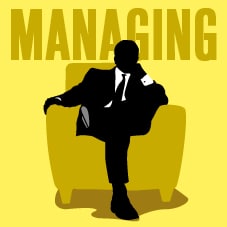“Stephanie hated me at first. She thought I was really annoying.”
– Chad Burton
“I thought Chad was trying to pump me for free information. He was on his iPad the whole time.”
– Stephanie Kimbro
Whatever scenario by which a small law firm is built in your dreams, it is probably not the way it plays out in reality. When Stephanie Kimbro, a solo attorney from North Carolina and 2009 winner of the American Bar Association’s annual award for Excellence in eLawyering, decided to join Chad Burton’s Ohio-based Burton Law LLC, they’d only met in person one time.
No matter. They had plenty of other methods to get to know each other.
To this point, two years into her employment with the firm, Stephanie has been to Ohio only one time, for a Dayton Dragons minor league baseball game. Of course, she’s not alone: to date of the eight lawyers employed by Chad’s firm, none of them work in a traditional law office, and two live on the East Coast. But, how is it that a small law firm can provide effective service to its client, and the requisite amount of collegiality to its members, when each of the attorneys inhabits his or her own physical workspace?
Mobile technology, that’s how.
Small Law Writ Large: Remote Connections
Although Stephanie works from her own desk, or some other desk, most of the time, she’ll always have at least two laptops (one for drafting, one for video gaming — for legitimate, work-related purposes (really!)) and an iPad (for firm email) fired up. Stephanie is on the road 40 percent of the time; but, her home office and her away office(s) are virtually the same, since her technology travels with her.
Burton Law uses Yammer (an enterprise social network for businesses — think: Facebook for your office), so that Stephanie can communicate with her colleagues, in real time, from wherever she has a secure Internet connection. “I still haven’t met Brandon,” she says, “but I feel like I know him.”
Chad never works from a desk; and, since April of 2013, following the American Bar Association’s TECHSHOW, he has exclusively used his iPad and iPhone for work. He’s even given up his Bluetooth keyboard, to find that he’s just as proficient typing onto his iPad screen. Despite utilizing different technology tools in their daily workflows, both Chad and Stephanie can access and leverage the same essential firm data from a single repository, which is essential.
Of course, for mobile attorneys, cloud-based case management systems (Burton Law uses Clio) are a boon. The ability to access complete client information and case files with only a secure Internet connection and log-in makes it possible for lawyers to work anywhere, at any time. For Chad and Stephanie, this means that they can collaborate on documents within a secure protocol, assign tasks to administrative personnel, run conflict checks on potential clients, and schedule deadlines and settle meeting times on the fly. Chad and Stephanie are both self-admitted workaholics, likely to find each other across their internal firm connections on weekends, during evenings and at other times removed from traditional “office hours.” When they do, Stephanie says that “it’s nice to have everything in one place.”
In any law firm, data controls must be applied to make case information intelligible. Without naming conventions for files, each attorney and staffperson would call their documents whatever they’d like, making it impossible for colleagues to jump into a file, and to know what was going on. Without protocols for maintaining secure accounts and devices, one careless user could expose the entire firm to massive liabilities. Within a mobile practice, the application of systems (documented, and bought into) is perhaps more imperative than in the traditional practice, since the shadow of compliance is merely a virtual one. Mobile lawyers must have, or gain, an established knowledge not only of the programs they use, but of the ways in which they will use them.
At Burton Law, “policies and procedures hold the firm together,” according to Stephanie. “Chad is very structured in his thinking and planning,” she continues, and order is maintained “even though each attorney uses a unique combination of separate, piecemeal solutions to get results.”
Underscoring its mobile bent, Burton Law issues an iPad to each new attorney it hires. Even though employees use various other devices as well, Chad corrals that usage by mandating “comprehensive sets of procedures and policies to maintain security.”
Just Another Link in the Evolutionary Chain
Chad, however, views Burton Law’s standing in the law firm revolution as something more like another link in the evolution of law practices. Nor is Burton Law always looking for the next thing; they’re just seeking the best thing. One of the recent developments Chad is most excited about is that Burton Law has taken on a new attorney … and his traditional, physical office space. The new hire will be able to integrate additional mobility into his practice, and Burton Law will be able to provide as-needed physical office space to its Dayton-based lawyers. Chad sees this as an evolution for both firms, and looks forward to “changing both dynamics.”
Stephanie says the benefit of a virtual law practice, properly run, is that you can “offer a complete range of legal services in either a virtual or offline environment, as specific needs arise.”
Of course, it’s a staggering leap for many attorneys to think of offloading an entire practice of law, or a large part of it, to the web. But, to achieve the mobility so useful (and probably necessary) to the modern practice, small firm lawyers must begin to leverage, and to secure, online access options. But Chad asserts that the virtual law practice is “not as bizarre, at the end of the day, as people think. It’s taking the standard skill sets of a lawyer, and using them in different forms.”
In the final analysis, he says, “It ends up creating a more organized version of the law firm, one that introduces more secure ways to store data.”
Jared Correia is Assistant Director and Senior Law Practice Advisor at the Massachusetts Law Office Management Assistance Program. Prior to joining LOMAP, he was the Publications Attorney for the Massachusetts Bar Association. Before that, he worked as a private practice lawyer. Jared is the author of Twitter in One Hour for Lawyers. He writes on practice management topics for Attorney at Work here, and for the LOMAP blog here. Follow @jaredcorreia.
So THAT’s a Virtual Law Practice …
Burton Law’s Chad Burton and his colleague Stephanie Kimbro are tapped with regularity to speak on issues and ethics surrounding practicing law in the cloud. So what truly distinguishes a virtual firm from your typical law firm? We asked Chad to put it in his own words.
Virtual Law Practice. The legal industry has not experienced such a trendy concept since “per stirpes” hit the scene back in the day. The virtual concept must be doing something right, though, because it is both embraced and disliked. … READ THE FULL POST
Illustration ©iStockPhoto.com























